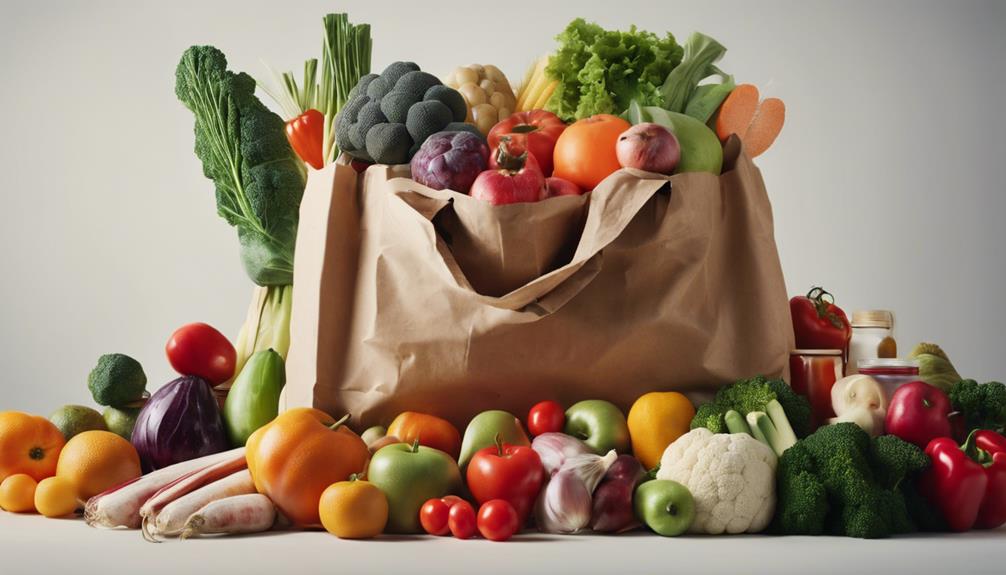To save money and maintain a healthy diet, start by planning your meals and buying whole foods in bulk. When cooking at home, you can feed your entire family for the cost of dining out, while also controlling ingredients and reducing food waste. By avoiding impulse buying and opting for whole foods rather than processed ones, you can stay on track with your goals. Choose generic brands for cost-effective alternatives and more servings per package. Implement smart shopping strategies like crafting weekly meal plans, utilizing discounts and coupons, and checking expiration dates. These tactics can help you achieve both affordability and health in your meals.
Key Takeaways
- Meal plan to save money and eat healthier.
- Choose whole foods and generic brands for cost-effective nutrition.
- Avoid impulse buying by sticking to a detailed grocery list.
- Utilize smart shopping strategies like sales, discounts, and coupons.
- Cook at home for savings, portion control, and ingredient management.
Meal Planning and Grocery Shopping
To save money and eat healthier, start by planning your meals and grocery shopping strategically. Meal planning helps you stick to a budget by reducing food waste and avoiding impulse purchases. Create a weekly meal plan, incorporating whole foods and buying in bulk to save money in the long run. Make a detailed grocery list based on your meal plan to guarantee you only buy what you need.
When grocery shopping, focus on the store's perimeter where fresh produce, meats, and dairy are usually located. Avoid processed foods and snacks that can add up quickly in cost. Utilize grocery list apps to stay organized and on track with your budget. Additionally, try to eat a snack before heading to the store to prevent unnecessary purchases driven by hunger.
Cooking at Home and Large Portions

Cooking at home and preparing large portions offer significant financial and health benefits. By meal planning and cooking at home, you can save money, as it can cost up to $16 less per meal compared to dining out. Large portions prepared at home not only save you money but also allow you to feed your whole family for the price of a single restaurant meal. In addition, cooking in bulk helps reduce food waste, as leftovers can be repurposed into new meals, making your food budget more efficient.
| Benefits of Cooking at Home and Large Portions |
|---|
| Save money |
| Meal plan |
| Less expensive |
| Control ingredients |
Furthermore, cooking at home enables you to control the ingredients, ensuring that your meals are healthier and more cost-effective. Meal prepping large portions can also be a time-saving strategy during busy weeks, eliminating the need for last-minute takeout and contributing to a more organized and healthier lifestyle.
Avoiding Impulse Buying

Avoid impulse buying by being mindful of your hunger levels before going to the grocery store. Shopping on an empty stomach can lead to impulse buys, so it's crucial to have a snack before you go.
To stay healthy on a budget, opt for whole foods over processed ones. Whole foods not only provide better nutrition but also help you avoid impulse purchases of unhealthy snacks.
It's important to stick to your list when shopping to prevent unnecessary spending on items that don't align with your meal plans. Utilizing grocery list apps can help you stay organized and focused while navigating the store, reducing the temptation for impulse buys.
When shopping, avoid the center aisles where processed foods are prominently displayed, and instead, focus on the perimeter of the store where you'll find fresh produce, proteins, and other whole food options.
Choosing Whole Foods and Generic Brands

When looking to save money on groceries while maintaining a healthy diet, consider choosing whole foods and generic brands as cost-effective options. Here are some key points to keep in mind:
- Whole foods like block cheese and canned beans are nutritious choices that won't break the bank.
- Generic brands offer quality alternatives to pricier name brands, helping you stay within your food budget.
- Whole grains and generic brands often provide more servings per package compared to processed options, making them economical choices for meal planning.
- Opting for whole foods and generic brands not only saves you money but also promotes healthier eating habits.
- By selecting whole foods and generic brands, you can enjoy the benefits of nutritious choices without compromising on quality or taste. Remember, making these simple switches can go a long way in stretching your food budget while prioritizing your health.
Smart Shopping Strategies

Craft a weekly meal plan to guide your grocery shopping and prevent impulse buys. By planning your meals in advance, you can save money and make sure you only purchase what you need.
Create a shopping list based on your meal plan to stay on track and avoid unnecessary purchases. Look out for sales, discounts, and store flyers to maximize your savings at the store.
Take advantage of coupons, digital discounts, and loyalty programs to save even more money on your purchases. Consider buying in bulk for commonly used items to get better value and reduce the cost per unit.
When shopping, opt for less expensive store-brand options that can be just as nutritious as name brands. Check the expiration dates and shelf life of products to avoid food waste and make sure you're getting the most out of your purchases.
Frequently Asked Questions
What's the Best Way to Save Money and Eat Healthfully?
Want to save money and eat healthfully? Plan meals and make a grocery list to cut impulse buys. Opt for store brands, whole foods like beans and oats, and skip highly processed items. Use coupons for extra savings.
How to Make Healthy Food Affordable?
To make healthy food affordable, focus on seasonal produce for freshness and savings. Cook in bulk for leftovers, choose budget-friendly proteins like beans, and plan meals ahead with a shopping list. These simple steps help you eat well without breaking the bank.
How Can I Live Frugally and Healthy?
Live frugally and healthy by planning meals with affordable ingredients like beans and seasonal produce. Use coupons and loyalty programs to shop smart. Cook at home to control portions and save money. Grow your own herbs for fresh, budget-friendly options.
What Should I Eat on a Tight Budget?
When on a tight budget, focus on budget-friendly proteins like beans, lentils, and eggs. Opt for whole, fresh foods over processed options. Prioritize in-season produce for affordability. Plan meals in advance to avoid impulse buys and maximize your grocery budget.
Conclusion
To wrap up, by following these tips for affordable and healthy eating, you can take control of your budget and your health. Why spend more money on processed foods and eating out when you can plan ahead, cook at home, and make smart choices at the grocery store?
With a little effort and mindfulness, you can enjoy delicious meals while saving money and nourishing your body with whole, nutritious foods. So, are you ready to take the first step towards a healthier and more budget-friendly lifestyle?









